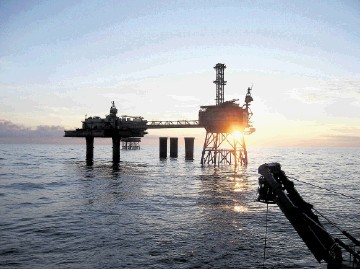
DECOMMISSIONING has long been a Damocles sword hanging over the North Sea oil and gas industry.
As the D-date creeps forward, is all that set to change?
The industry hopes so. After launching a joint taskforce with the UK Government earlier this year and then receiving the Treasury’s blow in the form of a cap on its decommissioning tax relief, on top of the £10billion tax grab, the pressure has been mounting for a resolution.
Apart from the actual cost of decommissioning itself, which is said to have risen from about 3% of value in recoverable reserves to about 10% now, much of the issue lies around the liability for those costs.
Because everyone ever involved in an asset is potentially liable for its decommissioning costs, firms looking to buy assets are being obliged by vendors to provide letters of credit to guarantee that they will be able to cover those costs.
This includes the chunk of the cost the government previously promised to pay in the form of tax relief.
And, uncertainty over whether the government will stump up the cash has also pushed up the security requested, sometimes up to one-and-a-half times the cost, potentially more than the price of the asset, according to Talisman’s finance and business vice president Aernout van der Gaag, who leads the industry/government group.
This effectively locks up cash firms could otherwise use as capital for exploration and has slowed asset transferals.
Uncertainty over the future level of tax relief also makes it a hard decision for firms on whether to invest in an asset or decommission it while the tax relief is still available.
Malcolm Webb, chief executive of Oil & Gas UK says “asset deals have slowed down to a trickle”.
Both BP and Conoco Phillips have had assets up for sale for the best part of this year. But as yet, there has been no announcement of a buyer.
Mike Tholen, economics and commercial director at Oil & Gas UK, said: “There are attractive opportunities but a lot of baggage. We need to find new ways, new opportunities, but not be penalised for decommissioning.
“The industry is not now fond of the government but they are working together. Both industry and financial institutions looking in to this want to know government will pay its share.”
Over the past weeks and months advances have been made, said Derek Leith, tax partner, oil and gas at Ernst & Young and there are ideas on the table.
“One is to find a way to better hold the government to providing the tax relief, not just the current government but future governments and something more concrete than measures in a finance bill that could be retracted in the next parliament,” said Mr Leith.
This could mean the security required by vendors to ease potential risk of buyers defaulting might not have to be on the current pre-tax basis.
This could be done through some form of contractual agreement. Recent discussions are said to have been promising and a meeting was scheduled with Treasury Secretary Justine Greening at the end of September.
“I feel we have made enormous progress getting down to one to two solutions,” said Mr Leith.
“But there was a reminder that at the end of the day if we get the government to adopt the solutions we feel are appropriate we will still not know at that point if the industry (the vendors) will feel it is enough to reduce the risk.”
Mr Webb said: “The government needs to give a bankable assurance it is going to meet its side of the bargain. We think solving this has good potential to unleash quite a lot of activity, asset transferal and investment.”
The industry is hopeful of a resolution.
The government has said it was working with the industry with the aim of announcing “further, longer-term certainty on decommissioning” in the 2012 Budget.
However, at Offshore Europe, Ms Greening would not commit to a timeframe, saying the issue had been a problem for many years and if it was easy so solve it would have been already.
Recommended for you
